New Star Steveson Stuns Petriashvili in Olympic 125kg; Mukaida Strikes Gold
Friday, August 6, 2021 - 13:27 By Ken Marantz

CHIBA, Japan (August 6) -- Gable STEVESON (USA) worked his way onto the global stage with a name harkening back to a bygone legend in the sport. The 21-year-old certainly made a name for himself at the Tokyo Olympics.
Steveson pulled off the most unlikely of victories, scoring a takedown in literally the final second to stun three-time world champion Geno PETRIASHVILI (GEO) in the freestyle 125kg final on Friday night.
"I don’t know what I’m really feeling right now," said Steveson. "It hasn’t hit, it hasn’t even soaked in. It is a crazy feeling that I’m sitting with a gold medal around my neck. This is something that will sit with me forever."
In other finals, Mayu MUKAIDA (JPN) gave Japan its third women's gold at the Tokyo Olympics after also needing a comeback -- albeit not as dramatic as Steveson's -- to capture the women's 53kg title, while Zaurbek SIDAKOV (ROC) added the freestyle 74kg gold to the back-to-back world titles he won in 2018 and 2019.

Steveson's performance at Makuhari Messe Hall A, in which he also knocked off defending Olympic champion Taha AKGUL (TUR) in the quarterfinals, was the stuff that legends are made of -- much like that of America's greatest wrestling hero, 1972 Olympic champion Dan GABLE.
It can only be called prescient that his parents gave their son Gable the middle name Dan. The Minnesota state native had given a taste of what was to come by winning consecutive world cadet titles in 2015-16 and the world junior title in 2017.
Coming into Tokyo, he had just one other senior international tournament under his belt, a victory at this year's Pan American Championships. While good preparation, it could hardly be regarded as an indicator of how he would fare against the world's best.
Steveson convinced any doubters with his quick single-leg lifts and acute awareness of how the international game is played, often a problem for Americans coming from folkstyle rules.
"I knew I had it in me," said Steveson, who became who the first American Olympic champion in the heaviest weight class since Bruce BAUMGARTNER (USA) at the 1992 Barcelona Games.
"Everybody talks about bringing home a gold medal, and I did it."
In the final, Steveson got an activity clock point, then opened eyes with a leg-lift and trip for a takedown and a 3-0 lead. The 27-year-old Petriashivili, certainly aware he needed to step up his game, got in on a single, but the American not only fought out of it, but reversed the situation and got a stepout to make it 4-0.

In the second period, Petriashvili took control. He and Akgul had combined to win every major global since 2014, and he was not going to let the streak end without a fight. Trailing 7-2, the Georgian got a single-leg takedown with 1:20 left, then added a gut wrench and tilt to take the lead for the first time, 8-7.
With time running out, Steveson forced Petriashvili down, then kept spinning around until he secured control with the last click on the clock. An unsuccessful challenge made the final score 10-8.
"I was guaranteed a medal, but I knew I could fire that last shot off and give him that last trick, and he bit it," Steveson said. "I looked at the clock, and it was like point-three. And I was like, no way, my head was just like flush with everything, my face was like, stunned."
After a hug with his coach and a lap with the American flag, Steveson celebrated his victory with a cartwheel and back flip, quite an impressive feat for such a large man who is only just showing what he is capable of doing.

Mukaida, a two-time world champion at 55kg, had formed a bad habit of snatching defeat from the jaws of victory with last-second losses in big matches. It is the reason for one of her two world silver medals at 53kg.
In Friday's final against Qianyu PANG (CHN), it was Mukaida who had to play catch-up, which she did for a 5-4 victory that returned the Olympic 53kg title to Japanese hands.
"I usually lead first, but my opponents overtake me quite often," Mukaida said. "This time it was the other way around, I was behind. I had the resolution to win at the end. The strong emotion is what made me win this match."
Pang, ignoring the fact that she had lost all four previous meetings with Mukaida, jumped out to a 4-0 lead with a snap-down, spin-behind takedown and a gut wrench. That's how the first period ended.
In the second period, Mukaida got fired up, and scored successive takedowns to go ahead on criteria with about 1:20 left. She didn't just sit on the lead, and went for a single leg which she held onto for dear life as Pang desperately tried to break the hold and get behind.
But Mukaida not only did not let go, she managed to score a stepout. After that, she held off the Chinese to secure the gold.
"First, I couldn’t tackle her like I always do," Mukaida said. "But in the six minutes I was able to do my style of wrestling with a very strong determination to win. She was very strong, I wanted to beat her, and I was determined to get a gold medal. I continued to have that feeling throughout the six minutes."
Mukaida has faced high expectations in Japan by being tabbed as the second coming of three-time Olympic champion Saori YOSHIDA (JPN), as she is from the same Mie Prefecture and wrestles in the same weight class.
After winning the first three golds when women's wrestling was added to the Olympic program [55kg at the time], Yoshida surrendered the 53kg title in Rio. Now Japan has it back.
"Yoshida won many times in a row so you can't compare me to her," Mukaida said. "But I was the one who was selected [for the Olympics], and however it happened, I wanted to win the gold."

Sidakov's 7-0 victory over Russian-born Mahamadkhabib KADZIMAHAMEDAU (BLR) in the 74kg final may have lacked the drama of the other two, but it was no less impressive.
After the first period was limited to an activity clock point, Sidakov started off the second with a takedown and an exposure from a cradle off a tackle counter. He then sealed the deal with a pair of stepouts against his onetime comrade, who switched nationalities to Belarus in 2020.
"This gold just reminds me of all the hard work, all the sweat that I've dropped in training for this," Sidakov said. "I'd like to thank everyone who supported me through the hardest parts of the job....This gold medal means I've got the best success in my sport and I can't really express
my feelings right now."
In the bronze-medal matches, world 79kg champion Kyle DAKE (USA) assured he won't leave his first Olympics empty-handed when he defeated Frank CHAMIZO (ITA) 5-0 at freestyle 74kg, denying the Cuban-born Italian a second straight Olympic bronze.
Dake, bouncing back from a one-sided loss in the quarterfinals to Kadzimahamedau, put the pressure on early and scored a pair of stepouts, then added 2 with a counter lift for a 4-0 lead in the first period. In the second, he was never threatened and added a late stepout.
"I was able to bounce back and wrestle more like my old self today," Dake said. "A couple of hiccups here and there and you just battle through them.
"Frank is a beast, so for me to put in the performance I did, I just have to thank all of my training partners and coaches, my folks back in Hawaii, everyone who has got me here. I competed really well, didn’t give up any points, and I’m excited for the World Championships in a couple of months."
The other 74kg bronze went to Bekzod ABDURAKHMONOV (UZB), who gave Uzbekistan its first wrestling medal of the Games with a 13-2 technical fall in the first period over Daniyar KAISANOV (KAZ).
Abdurakhmonov, a two-time world medalist who attended college in the United States, came out firing on all cylinders, scoring a takedown and two lace locks, then a takedown and exposure.
It was much easier going than Abdkurakhmonov's 3-2 win in the final at the 2018 Asian Games over Kaisanov, the 2019 and 2020 Asian champion who was upgraded to 2019 world bronze medalist after a doping disqualification.
At freestyle 125kg, Akgul, having already been dethroned as Olympic champion, came away with a bronze medal by scoring a takedown in each period of a 5-0 victory over Lkhagvagerel MUNKHTUR (MGL).
Amir ZARE (IRI), the 2019 world U-23 champion, took the other bronze in that weight class, also with a 5-0 win, although he did with three stepouts and two activity points against a defensive Zhiwei DENG (CHN).
Both of the women's 53kg bronze-medal matches, won by Vanesa KALADZINSKAYA (BLR) and Bolortuya BAT OCHIR (MGL), ended in the first period. Kaladzinskaya, the 2018 world champion, caught 2019 world 55kg champion Jacarra WINCHESTER (USA) in a headlock and ended the match by fall in 2:09.
Bat Ochir both scored and gave up a pair of takedowns against Joseph ESSOMBE TIAKO (CMR), but the Mongolian complimented hers with a succession of lace locks for a 14-4 technical fall in 2:37, giving her country its first wrestling medal in Tokyo.
Sadulaev, Snyder set up 3rd showdown
In semifinal action, another chapter will be added to the storybook rivalry between Rio Olympic champions Abdulrashid SADULAEV (ROC) and Kyle SNYDER (USA) after the two advanced to the freestyle 97kg final in oddly similar manners.
Sadulaev earned an activity point and three stepouts in beating a defensive Reineris SALAS PEREZ (CUB) 4-0, while Snyder did the same with 2020 European 92kg champion Suleyman KARADENIZ (TUR), except he had one more stepout in a 5-0 victory.
"I feel good, I’m looking forward to tomorrow," Snyder said. "I think about [Sadulaev] a good bit, but I’m just ready to wrestle again, ready to go....I've wrestled better each match and tomorrow night I will wrestle my best."
Sadulaev was just 20 when he won the 86kg gold at the Rio Olympics, where a 21-year-old Snyder triumphed at 97kg. Sadulaev moved up to 97kg the next year, and their paths first crossed in the final at the 2017 World Championships in Paris, where Snyder prevailed to take the gold.
But the tide turned Sadulaev's way after that, as he avenged the loss the next year in the final in Budapest. At the 2019 World Championships, a third clash never came about after Snyder lost in the semifinals to 2012 London Olympic champion Sharif SHARIFOV (AZE), whom Sadulaev beat for his second straight world title and fourth overall.
Leading up to the Tokyo Olympics, Sadulaev made it to the final at the Ranking Series Ali Aliev tournament in June, but defaulted the final to Magomed IBRAGIMOV (UZB) due to injury.
Sadulaev appears to be at full strength in Tokyo as, starting with a 5-0 win in the opening round against Sharifov, he did not concede a point in any of his matches.
It was very good day for the home team--albeit without spectators to see and cheer them on -- when former world champions Takuto OTOGURO (JPN) and Yui SUSAKI (JPN) both knocked off a reigning world titlist to make their respective finals.
Otoguro's run into the freestyle 65kg final has to be regarded as the more extraordinary, in that he needed to beat both of the wrestlers who defeated him at the 2019 World Championships.
Having gotten past Iszmail MUSAZUKAJEV (HUN), who beat him in the bronze-medal match in Nur-Sultan, his path to the final was blocked by world champion Gadzhimurad RASHIDOV (ROC). The memory of the 8-1 pasting he was handed by the Russian in the first round has been a motivating factor ever since.
It was a very different outcome in Tokyo, as 2018 world champion Otoguro scored a first-period takedown and a second-period stepout, then held on despite giving up two penalty points for a 3-2 victory.
"This is my first Olympics final so I am so excited for that," Otoguro said. "After the Games were postponed, I worked on strategy with my coach to how to win the gold here. And now I am going to basics and keep following them."
In the final, Otoguro will face another familiar face from Nur-Sultan in Rio 2016 bronze medalist Haji ALIEV (AZE), who advanced with an impressive 12-5 victory over the ever-dangerous Bajrang PUNIA (IND). At the 2019 worlds, Otoguro defeated Aliev 11-9 in a wild and very tempestous repechage match.
Susaki, a two-time world champion who has never lost to a non-Japanese opponent, will look to achieve her dream of an Olympic gold medal when she faces Rio bronze medalist Yanan SUN (CHN) -- an opponent she has already beaten three times.
Susaki made the final with an 11-0 technical fall of reigning world champion Mariya STADNIK (AZE), who once again failed to scale a Japanese wall at the Olympics.
Susaki, who had beaten Stadnik in two previous meetings including the final of the 2018 worlds, broke open a conservative match in the second period with a 4-point front headlock roll, to which she added a succession of lace locks to end the encounter at 3:47.
"It’s a dream come true," Susaki said. "I have waited for this for 8 years. I was the flag bearer [at the opening ceremony] with the basketball player [Rui HACHIMURA] so it was huge honor and I am very proud to represent Japan. I can’t wait for tomorrow and will give my best."
The 33-year-old Stadnik will now go for her fourth Olympic medal in the bronze-medal match, without any of them being gold. She lost in the London 2012 final to Hitomi OBARA (JPN) and the Rio 2016 final to Eri TOSAKA (JPN).
Sun showed that no lead is safe against her as she pulled off a stunning comeback victory over Sarah HILDEBRANDT (USA), scoring a 4-point lateral drop with 3 seconds left for a 10-7 victory.
"I'm very happy to get into the final," Sun said. "It was a high-tension match and this match told me I have to never give up during a match."
Hildebrandt, the 2018 world silver medalist, dominated the match against the three-time world medalist, building up a 7-1 lead in the first period. But Sun stormed back in the second, gradually cutting the gap with a front headlock roll and takedown before nailing her big move.
"My opponent became too passive because I knew she wanted not to lose any further points until the end of the match," Sun said. "I thought I still had plenty of time to make a comeback. To be honest, I was not considering the time so much, I just tried my best to stay calm and find my chance to win."
While Susaki is 3-0 head-to-head against Sun, their last encounter was close, a 3-2 by Susaki at the 2019 Women's World Cup.
Day 6 Results
Freestyle
65kg
SF1 - Takuto OTOGURO (JPN) df. Gadzhimurad RASHIDOV (ROC), 3-2
SF2 - Haji ALIYEV (AZE) df. Bajrang PUNIA (IND), 12-5
74kg
GOLD - Zaurbek SIDAKOV (ROC) df. Mahamadkhabib KADZIMAHAMEDAU (BLR), 7-0
BRONZE - Kyle DAKE (USA) df. Frank CHAMIZO (ITA), 5-0
BRONZE - Bekzod ABDURAKHMONOV (UZB) df. Daniyar KAISANOV (KAZ) by TF, 13-2, 2:13
97kg
SF1 - Abdulrashid SADULAEV (ROC) df. Reineris SALAS PEREZ (CUB), 4-0
SF2 - Kyle SNYDER (USA) df. Suleyman KARADENIZ (TUR), 5-0
125kg
GOLD - Gable STEVESON (USA) df. Geno PETRIASHVILI (GEO), 10-8
BRONZE - Amir ZARE (IRI) df, Zhiwei DENG (CHN), 5-0
BRONZE - Taha AKGUL (TUR) df. Lkhagvagerel MUNKHTUR (MGL), 5-0
Women's Wrestling
50kg
SF1 - Yui SUSAKI (JPN) df. Mariya STADNIK (AZE) by TF, 11-0, 3:47
SF2 - Yunan SUN (CHN) df. Sarah HILDEBRANDT (USA), 10-7
53kg
GOLD - Mayu MUKAIDA (JPN) df. Qianyu PANG (CHN), 5-4
BRONZE - Vanesa KALADZINSKAYA (BLR) df. Jacarra WINCHESTER (USA) by Fall, 2:09 (4-0)
BRONZE - Bolortuya BAT OCHIR (MGL) df. Joseph ESSOMBE TIAKO (CMR) by TF, 14-4, 2:37

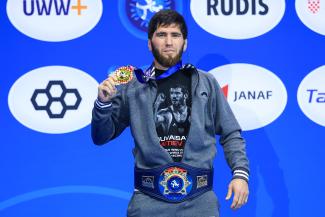
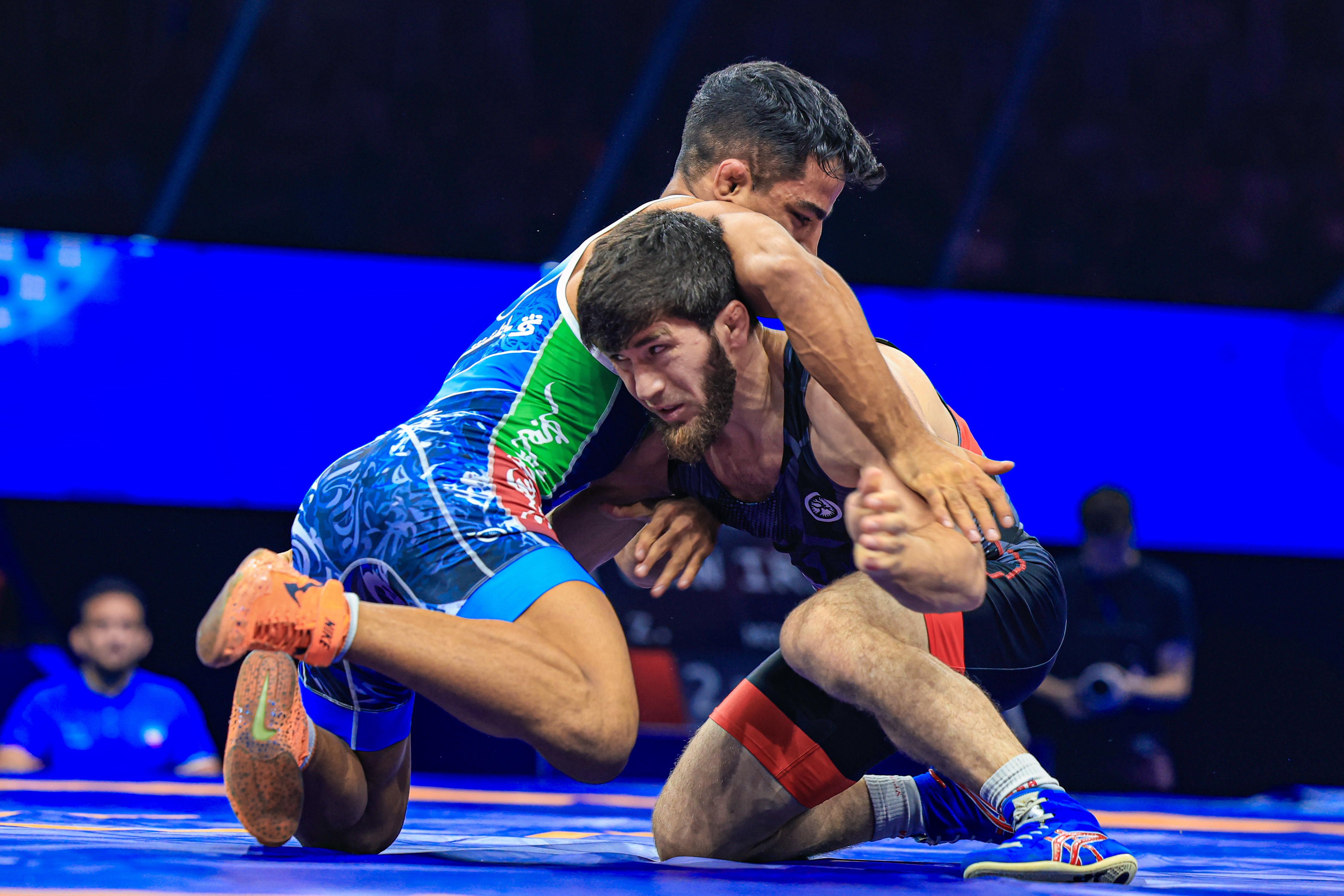 Zavur UGUEV (UWW) tries to score against Ahmad JAVAN (IRI) in the 61kg final. (Photo: United World Wrestling / Amirreza Aliasgari)
Zavur UGUEV (UWW) tries to score against Ahmad JAVAN (IRI) in the 61kg final. (Photo: United World Wrestling / Amirreza Aliasgari)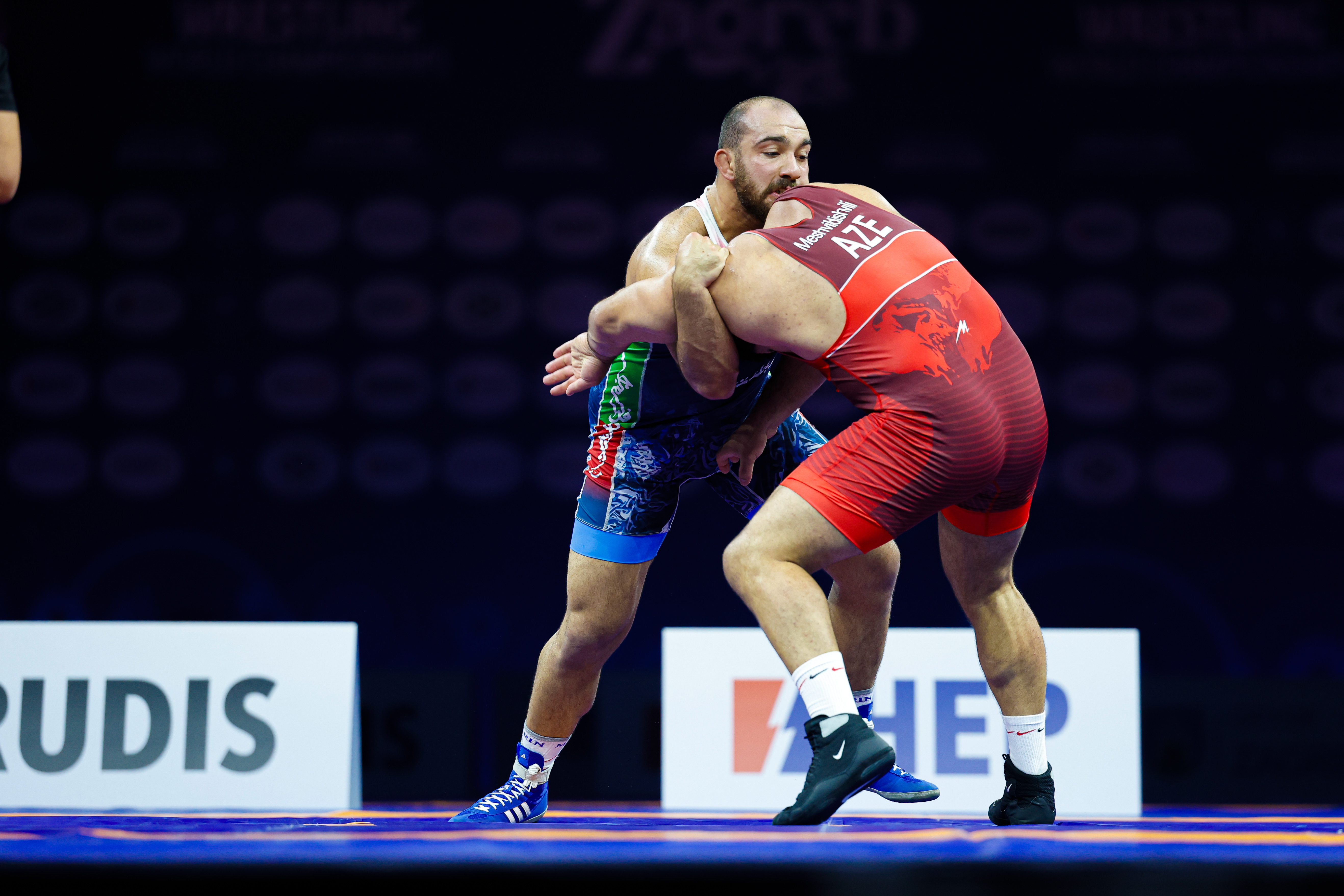 Amir Hossein ZARE (IRI) wrestles Giorgi MESHVILDISHVILI (AZE) in the 125kg final at the World Championships. (Photo: United World Championships / Kostadin Andonov)
Amir Hossein ZARE (IRI) wrestles Giorgi MESHVILDISHVILI (AZE) in the 125kg final at the World Championships. (Photo: United World Championships / Kostadin Andonov)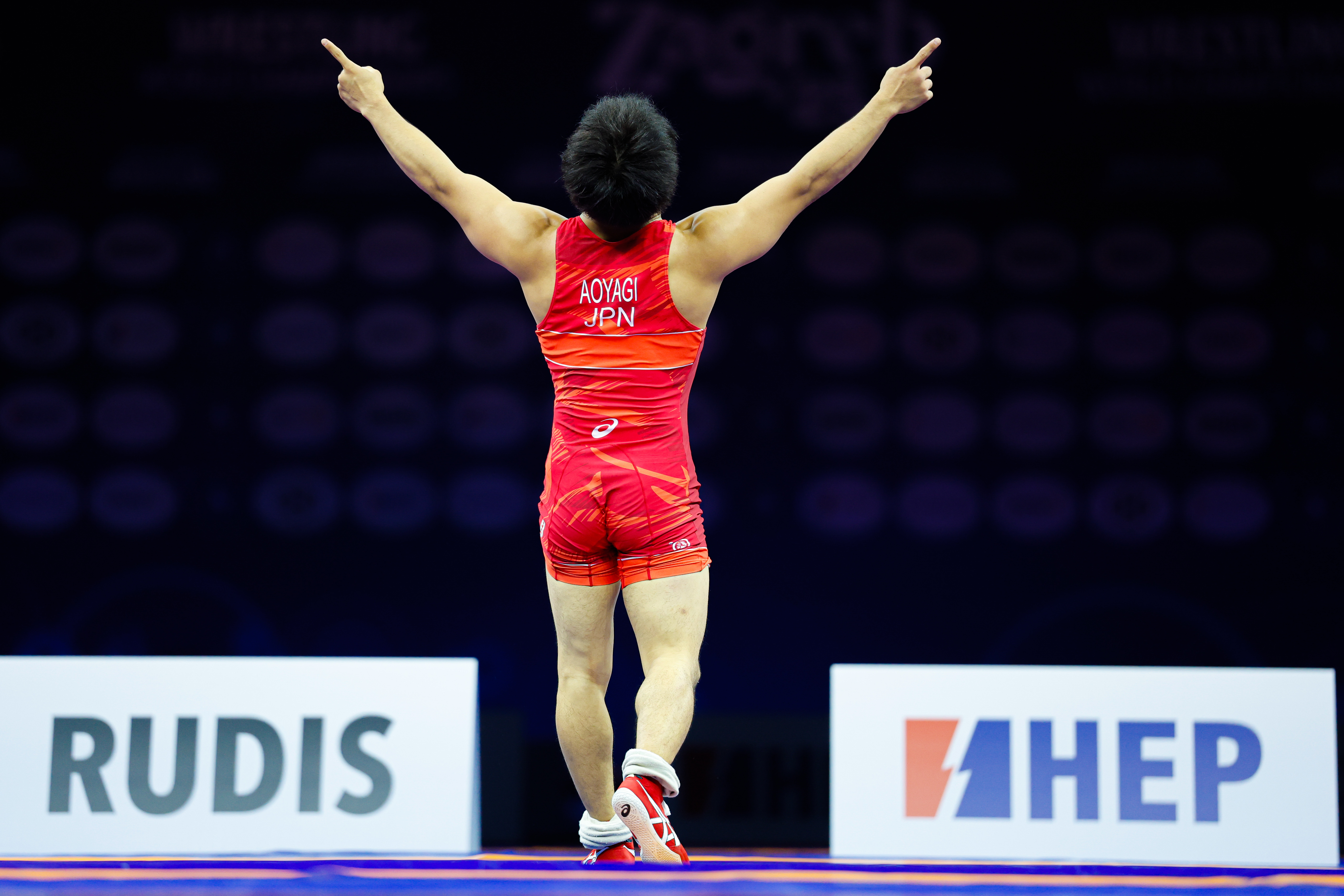 Yoshinosuke AOYAGI (JPN) celebrates after winning the 70kg final. (Photo: United World Wrestling / Kostadin Andonov)
Yoshinosuke AOYAGI (JPN) celebrates after winning the 70kg final. (Photo: United World Wrestling / Kostadin Andonov)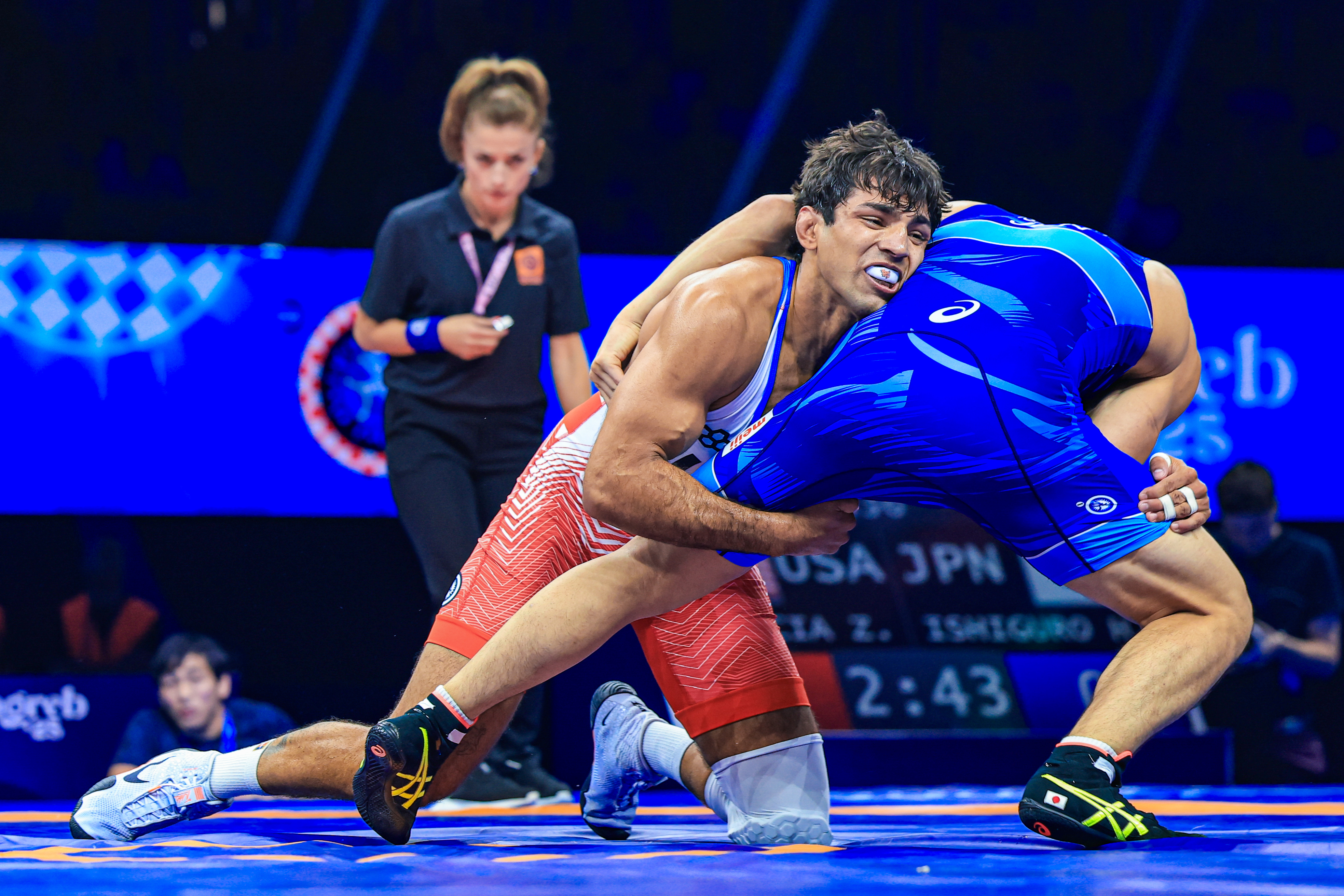 Zahid VALENCIA (USA) scores a takedown against Hayato ISHIGURO (JPN) in the 86kg final. (Photo: United World Wrestling / Amirreza Aliasgari)
Zahid VALENCIA (USA) scores a takedown against Hayato ISHIGURO (JPN) in the 86kg final. (Photo: United World Wrestling / Amirreza Aliasgari)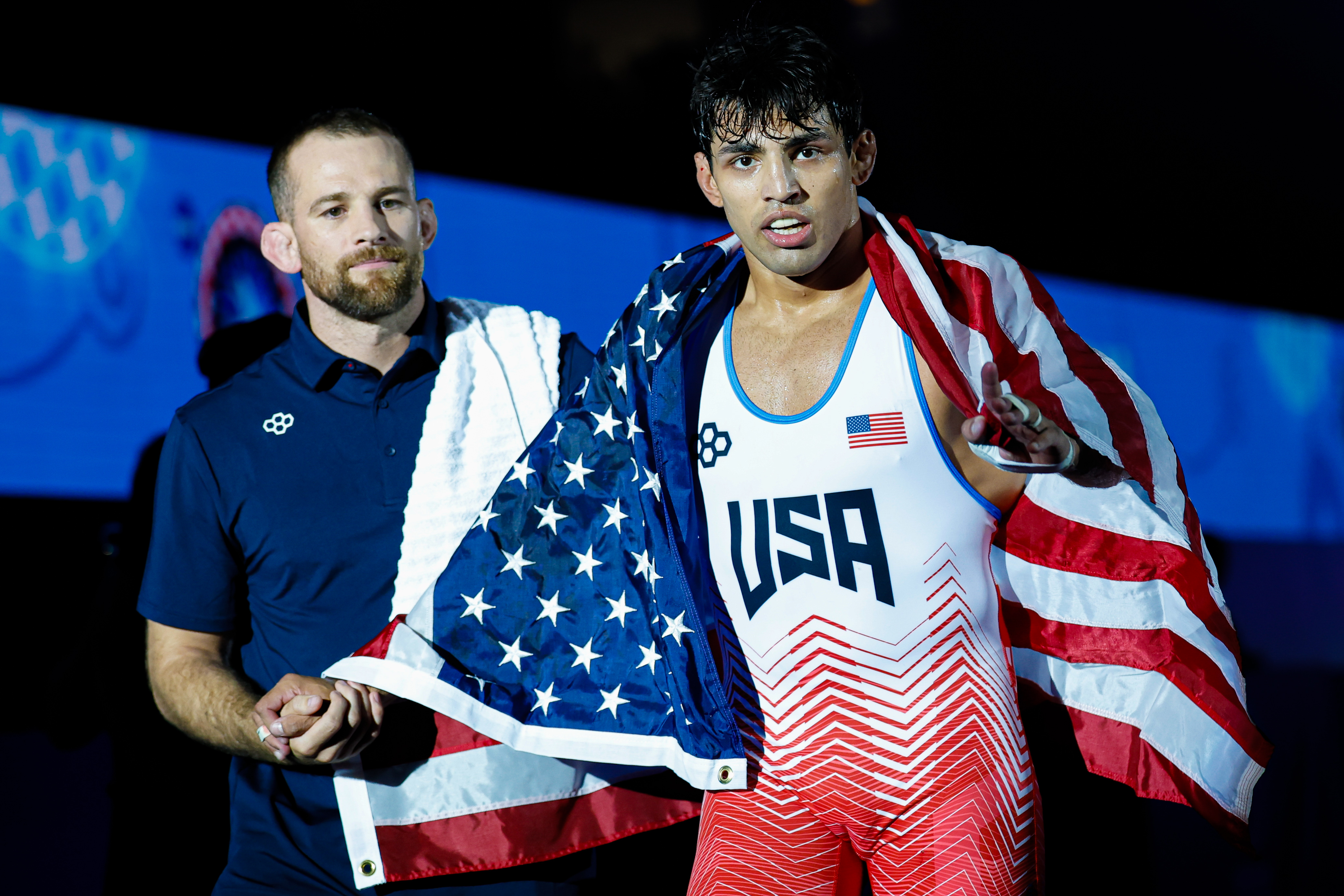 Zahid VALENCIA (USA), right, with coach David TAYLOR, after winning the 86kg final. (Photo: United World Wrestling / Kostadin Andonov)
Zahid VALENCIA (USA), right, with coach David TAYLOR, after winning the 86kg final. (Photo: United World Wrestling / Kostadin Andonov)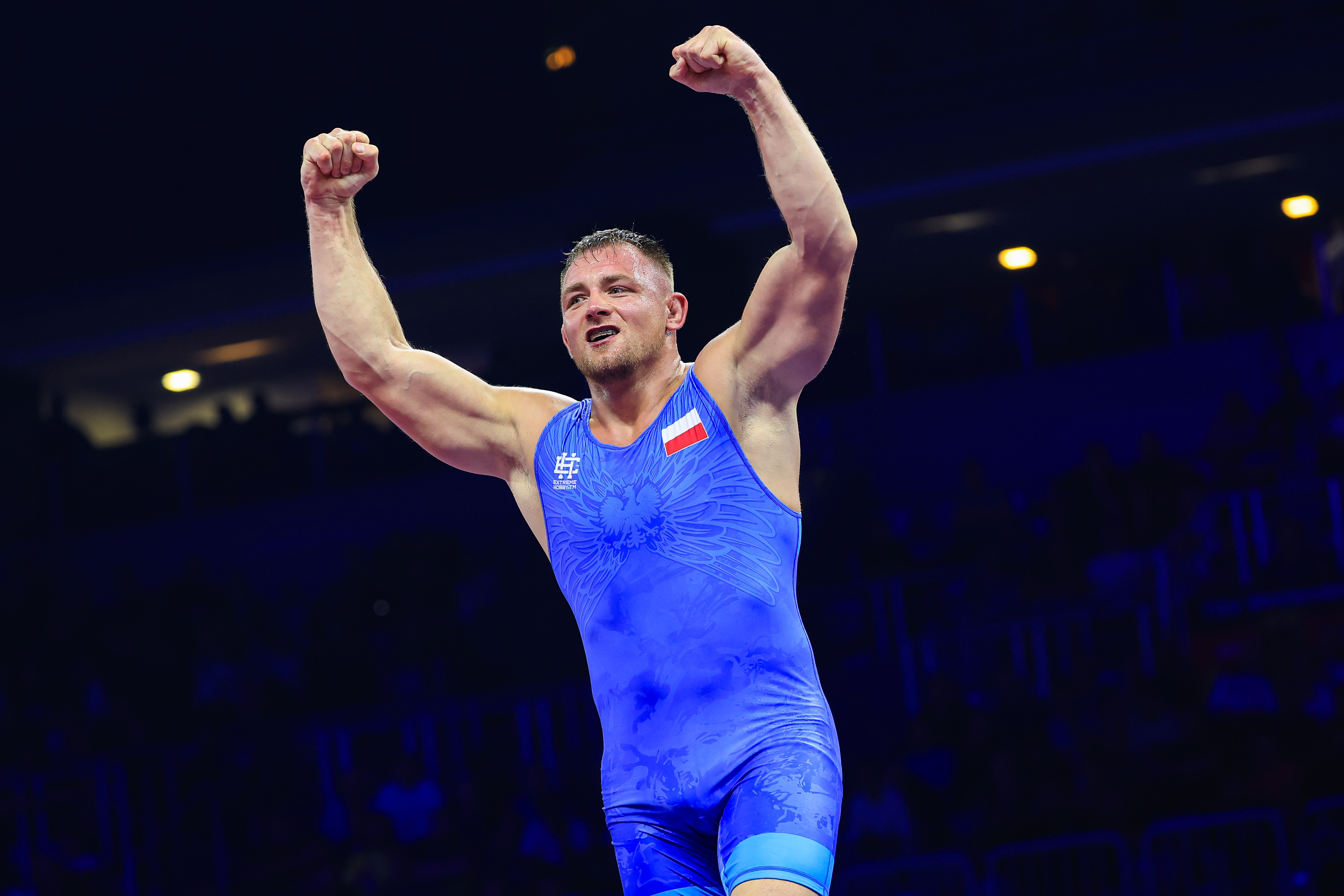 Robert BARAN (POL) celebrates after winning his bronze-medal bout at 125kg. (Photo: United World Wrestling / Kadir Caliskan)
Robert BARAN (POL) celebrates after winning his bronze-medal bout at 125kg. (Photo: United World Wrestling / Kadir Caliskan)
Share your thoughts.
Comments